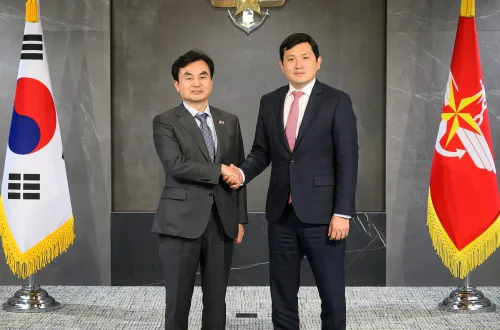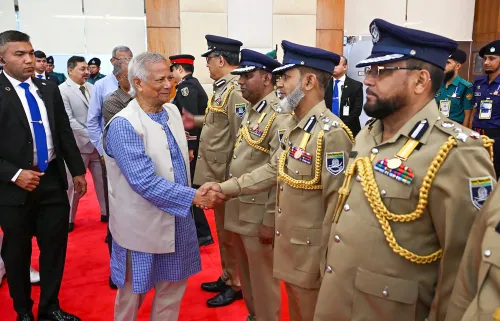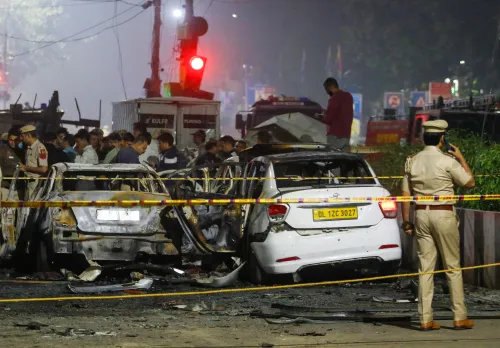Can a Peaceful Palestinian State Be Realized?

Synopsis
Key Takeaways
- The conflict began with a Hamas attack on Israel, leading to significant casualties.
- Israel's military response has resulted in a humanitarian crisis in Gaza.
- International intervention is essential for achieving peace.
- The concept of a Palestinian state should be revisited to ensure security for Israel.
- Long-term solutions must address the root causes of the conflict.
New Delhi, Aug 17 (NationPress) The ongoing unrest in the Middle East, marked by a tendency toward violence, can be traced back to the Hamas attack on Israel on October 7, 2023, which resulted in the deaths of 1,200 Israelis and the abduction of 250 individuals, including women and children, as hostages. India was quick to denounce this attack.
This incident prompted a justified retaliatory strike by the Israel Defence Forces (IDF), leading to a prolonged military campaign in Gaza, where Hamas has been known to operate from underground tunnels for protection.
The relentless military actions by Israel in Gaza, aimed at 'eliminating' Hamas, have resulted in over 50,000 Palestinian deaths, including both Hamas members and civilians, creating a severe humanitarian crisis wherein thousands, including children, are suffering from acute hunger—this situation is becoming increasingly intolerable globally.
Israel's current military offensive risks being perceived as 'unjust and immoral', shifting the blame for the humanitarian disaster in Gaza from Hamas to Israel. While it is true that Israel faces an existential threat due to the rejection of its statehood by regional Arab nations, it is equally crucial for Israel, along with its primary ally, the US, to acknowledge the necessity of a Palestinian homeland.
The idea of establishing a Palestinian state adjacent to Israel can be suitably adjusted to alleviate Israel's security concerns regarding such a state. The international community must urgently pursue a solution that allows for the peaceful coexistence of both nations in Palestine.
It is worth noting that the Arab Spring of 2010 significantly altered the dynamics of Middle Eastern governance by empowering grassroots movements and prompting a shift toward democratization in authoritarian regimes. However, this also led to a rise in radicalization, spawning numerous Islamic terrorist organizations.
Hamas originated as the Palestinian branch of the Muslim Brotherhood, which was established in 1928 in Egypt and Syria by the Islamic thinker Hasan Al Banna to oppose pro-Soviet nationalist regimes and advocate for the Islamization of the state.
The US-led West politically supported the Muslim Brotherhood, and in 2011, they quietly endorsed the ousting of Hosni Mubarak in Egypt.
Over the years, Hamas, initially a moderate Islamic group, became increasingly radicalized in response to Israel's heavy-handed tactics in Gaza and resorted to terrorism. Radical Islamic factions carry the historical memory of the 19th-century Wahhabi revolt against 'Western encroachment on Muslim lands' and harbor deep-seated animosity toward the US. This dynamic explains why, during the current military confrontation between Iran and Israel, Iran has embraced Hamas, united by their shared political hostility toward the US despite the longstanding Shia-Sunni divide.
There is a critical lesson for the democratic world in the alliance between the Sunni radical Hamas and the fundamentalist Iran. Faith-based militancy in any part of the Muslim world must not evolve into Islamic terrorism—a phenomenon fueled by the distress among Muslims that renders them susceptible to jihadist ideologies. The situation in Gaza must be viewed through this lens.
The Middle East is currently overshadowed by a conflict between Iran and the US-Israel alliance, while the Hamas-Israel dispute remains unresolved. Iran has powerful proxies, including Hezbollah in Lebanon, the Islamic Revolutionary Guard Corps (IRGC) active across multiple Middle Eastern nations, and Shiite militants in Iraq and Syria, alongside Hamas in Gaza. Iran’s alliance with Hamas could further escalate the chaos in Palestine—it's often said that 'wars lacking a clear political objective cannot be won' and will only lead to disaster.
A significant concern in the Middle East is that the Iran-Israel conflict is showing signs of evolving into a 'civilizational clash' between Islam and Zionism. Hamas has previously called for the 'establishment of an Islamic state' between the Jordan River and the Mediterranean governed by Sharia law.
Israel has grown increasingly distrustful of its Arab neighbors since Iran has militarily allied itself with Hamas, thereby bolstering its military capabilities against Israel. The Palestinian issue has long served as a unifying force among various factions, including Sunnis and Shiites or Arabs and Persians, in the name of faith. Even US-friendly Arab nations will struggle to normalize relations with Israel unless the Palestinian issue is resolved.
The so-called Abraham Accord, which was promoted by US President Donald Trump during his first term to strengthen ties between certain Arab nations like the UAE, Bahrain, Morocco, and Sudan, has stalled following the outbreak of the Iran-Israel conflict. Even close US allies like Saudi Arabia are disturbed by the escalation of US-Iran tensions, which has led to American strikes on Iranian nuclear sites.
The international community must intervene and advocate for a peaceful resolution that allows for Israel and a Palestinian state to coexist with mutual respect. It may be necessary to create more than one Palestinian entity along the Israeli border, and the deployment of an international peacekeeping force should be considered. A ceasefire in Gaza and the release of all Israeli hostages must be priority steps—taking hostages for political leverage is a classic act of terrorism and is wholly unacceptable.
The US-Saudi alliance should strive to establish a stable administration in Gaza, organize relief efforts, and initiate the 'reconstruction' of the area. Democratizing the Middle East is essential for achieving peace, as it will help curb the rise of faith-based militancy—equal treatment of all communities is fundamental to a democratic system.
Israel's security and Jewish democratic identity must proceed alongside a transition in Islamic fundamentalism toward an enlightened Islamic democracy where minorities are treated equally with the Muslim majority. A Muslim majority should facilitate the regime's adoption of the ultimate democratic principle of 'one person, one vote', as this does not conflict with majority rule. Regarding the ongoing US-Iran confrontation rooted in Israeli distrust of Iran's stated commitment to peaceful nuclear energy, it is notable that Iran has leveraged an ideological narrative of 'Islamic resistance' through a network of proxies to counter an aggressive US.
Furthermore, the IRGC has developed an advanced ballistic missile system as a deterrent, promising a robust retaliatory response.
In the cycle of action and reaction, Israel's attack on Iran aimed at dismantling its nuclear facilities on June 13, 2025, was met with an Iranian missile and drone strike on Tel Aviv and Haifa. This was followed by a direct US attack on Iranian nuclear sites utilizing bunker-buster bombs, marking the first American military intervention in the Middle East since the Iran-Iraq war of the 1980s.
Meanwhile, Israel has concentrated on weakening the leadership of the Iran-led 'axis of resistance'. President Trump has publicly called for Iran's 'surrender' concerning a new nuclear deal. A peace formula must be established between Iran and the US, emphasizing complete transparency regarding Iran's nuclear program, which should remain open to inspection by the International Atomic Energy Agency (IAEA).
Iran's current stance appears to be defensive, necessitating cautious approaches that do not undermine its 'civilizational pride'. Wisdom lies in preventing a volatile Middle East from devolving into a 'war of religions' marked by attrition, degeneration into faith-driven terrorism, and potential spillover into other regions.
Developments in the Middle East raise concerns for the democratic world at large, and initiatives aimed at restoring peace should be undertaken collaboratively by leading democracies.
It is also important to note that China and Russia support Iran due to their political opposition to the US. The Middle East must not become a catalyst for a potential resurgence of the Cold War.
(The writer is a former Director of the Intelligence Bureau)








